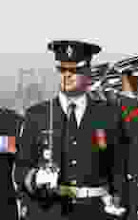For Remembrance day this year, I wanted to talk about my friend Harrison.
Captain Harrison K. Bird M.C. was an American from New York
State who joined the Canadian Army a bit more than a year after World War II
started. (More than a year before his nation
entered the war). He had studied in
England and all of his school friends were already serving and fighting, and he
felt he had to do his part. So, in the
Autumn of 1940, like many of his countrymen at the time, he decided to go North
and join the Canadian Army.
He was enrolled in the First Survey Regiment of the Royal
Canadian Artillery, and was soon in England training. He was one of the first soldiers trained on
the new invention of “Azdic” or “Radar” (although he hated the training,
because he hated math, and there was plenty of that involved). He then used those skills to help direct
anti-aircraft guns defending Britain. He
rose to the rank of Sergeant before he was able to enter officer training,
which was his goal.
He went through officer’s training as a member of the
Princess Patricia’s Canadian Light Infantry (PPCLI). Years later he always delighted in telling
the story of when he was on a bus in London at the time and a boy ran up and
asked him what the “PPCLI” on his shoulder stood for. A friend of his said “That’s the 151’st
Polish Paratroop Regiment”, and the kid said “Oh! I knew it was a good one!”
After he was trained he became a member of The Lake Superior
Regiment (Motor), one of only two motorized infantry regiments in the Canadian
Army. His regiment was the infantry
component of the Fourth Canadian Armoured Brigade, which consisted of three
armoured regiments (tanks) and one infantry battalion (his “Lake Soups”). He was in “A” Company of the Battalion,
assigned primarily to support the 21’s Armoured Regiment – The Governor General’s
Foot Guards.
These units fought so closely together that they developed
strong bonds with each other. The companies of the Lake Superior Regiment
painted their vehicles with the cap badges of the armoured regiments they
supported most, and in turn, the armoured regiments painted the Lake Superior
Regiment’s badge on their turrets.
This is why in the photo, you see Harrison standing beside
his half-track (named “Annabelle”) with the cap star of the Governor General’s
Foot Guards (GGFG) painted on the door.
Harrison fought all the way through France, Belgium, Holland and
Germany until the end of the war, aside from some recovery time when he was
wounded. He was awarded his Military
Cross (which is mentioned in the official Canadian History of World War II) for
patrolling across the river Maas during the winter of 1944-45. His company commander was wounded; he took
command of the patrol, bringing them back safe, along with a couple of
prisoners.
At the end of the war, he stayed on in Europe for a time as
a member of the occupation force, where he was promoted to Captain.
After the war he wrote several books about U.S. military history,
and was a historian at Fort Ticonderoga N.Y.
He was a dedicated member of the Lake Superior Regiment (now the Lake
Superior Scottish Regiment) Association, and attended their reunions into the
late 1980s.
He kept a handwritten list
of the names of the soldiers under his command that died in the war, tucked under
the glass covering his desk at home, and he read those names every day. Whenever I hear the phrase "We will remember them.", I think about Harrison reading these names every day.
Harrison had an affinity for bulldogs, and always had one as
a pet. One of them he named “Maas” after
the river. All of them are buried in his
family graveyard at Hulett’s Landing N.Y. with small headstones with their
names engraved.
Harrison was the Godfather to my second cousin, so he was
like a member of my family. In 1984 I
joined the Canadian Army - The Lincoln and Welland Regiment, a regiment that
Harrison had fought alongside during the war. From this point on, I became a favourite of
his in the family, and he was mine. When
I later transferred to the Governor General’s Foot Guards, he was even
happier. It was a joy to sit and talk “Army
stuff” with him.
Unfortunately, he passed away just a few months before I
took command of the Governor General’s Foot Guards. I will always remember the inspiration he
gave me.
Harrison was lucky and survived the war (I have the handwritten
journal he kept through the war – he had some very close calls!). He remembered the fallen every day after the
war. He motivated me when I became a
soldier. So, while I remember all
others that paid the ultimate price, I also remember him.


No comments:
Post a Comment